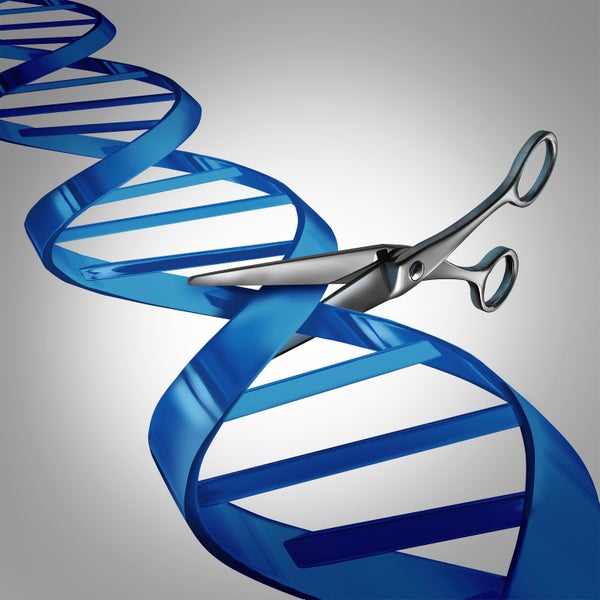The revolutionary gene-editing technology poised to reshape how researchers attack and prevent disease yesterday received a lukewarm reception from patient groups. Representatives from several patient advocacy organizations gathered in Washington, D.C., at a public meeting on gene editing to discuss if they would want researchers to one day tap this technology—first in the laboratory but eventually in the clinic—in an effort to prevent or treat serious inherited maladies including muscular dystrophy, cystic fibrosis and sickle-cell disease.
“We are not one advocacy or affected community,” said Sharon Terry, the president and CEO of Genetic Alliance and a member of the National Academies of Sciences, Engineering and Medicine panel that organized the meeting. Terry pointed to an earlier survey she conducted among more than 1,000 people in the patient community that pointed to human gene-editing opinions ranging from “What is gene editing?” to “Hell yes!”
Patients and their families are wrestling with these questions because new, powerful gene-editing techniques such as CRISPR–Cas9 allow researchers to make targeted changes in DNA much more easily than ever before. Such deletions or corrections could be made to either somatic cells or to the human germ line—eggs, sperm or embryos. Yet any tinkering with the germ line remains particularly controversial because such alterations would be passed down to future generations so any mistakes could inadvertently be introduced into a family’s gene pool.
On supporting science journalism
If you're enjoying this article, consider supporting our award-winning journalism by subscribing. By purchasing a subscription you are helping to ensure the future of impactful stories about the discoveries and ideas shaping our world today.
Patient groups were asked by the panel to consider what conversations about gene editing have already taken place among affected groups and who can speak for these groups as well as for future generations of individuals who could be affected by these conditions. Finally, panelists asked the speakers to voice what their own opinions are on gene editing.
There is a “compelling medical need” to intervene with mitochondrial disease, said Philip Yeske, science officer at the United Mitochondrial Disease Foundation. His first daughter died from mitochondrial disease at age one. He told the panel, if human gene editing can be proved to be “safe and efficacious,” then “we feel these techniques should be made available to our affected community as an option.”
Trevor Thompson, founder of The Sickle Cell Foundation of Tennessee, and a sickle-cell patient himself, said that, for him, “The jury is still out” on human gene editing. “I have a lot to learn and I want my decision to be based on facts not fears,” he told the panel. Yet even as he plans to educate himself, he says that the scientific community needs to build trust with the public for interventions like this to move forward. Thompson said he grew up in Tuskegee, Ala., and both his grandfathers were involved in the infamous Tuskegee syphilis experiments, which helped shape his world view.
Two months ago researchers, bioethicists and policy makers gathered for a related three-day International Summit on Human Gene Editing in Washington, D.C., but there was very little representation from the patient community on the scheduled panels. Still, even then, there were some indications of how emotionally charged this issue could become: At that summit, the mother of a child born with anencephaly, a condition linked with genetic causes, took the microphone from the audience and tearfully spoke about her son’s seizures during his six-day life. “If you have the skills and knowledge to eliminate these diseases, then freakin’ do it,” she said. At the conclusion of the summit, however, an expert committee decided that germ-line work should only proceed in the laboratory for now rather than include actual patients.
Yesterday’s event, like the prior meeting, was organized by a national committee that has been charged with conducting a comprehensive study of the different medical, ethical and scientific facets of human gene editing, including to the human germ line. It is a “discussion, not a finalization of opinions,” said Massachusetts Institute of Technology’s Richard Hynes, a cancer researcher and the co-chair of the national committee on human gene editing. “We’re a long way from a final opinion on any of these issues.” His group, however, is expected to issue recommendations for possible gene-editing guidelines later this year.
Tapping CRISPR–Cas9 is not the only way to help prospective parents who have concerns about hereditary conditions. In fact, many families could already screen for diseases passed on via genetic inheritance through existing reproductive technologies. Notably, an already available procedure called pre-implantation genetic diagnosis (PGD) involves screening cells removed from IVF embryos and then only implanting embryos that are apparently free of worrisome mutations. That option only works if there would be at least one embryo that would be mutation-free, however. For example, PGD would not be useful in rare cases where both parents are homozygous for a disease. So, if both parents have congenital deafness due to the same gene variant, all potential offspring would inherit the mutations that cause the disease. But PGD’s effectiveness also hinges on people using it at all—something most families would not currently do unless they already knew they were carriers of a disease or condition they would not want to pass on.
The promise of gene-editing technology for patients is “remarkable ” and “provides hope,” Abby Bronson, senior vice president for research strategy at Parent Project Muscular Dystrophy, told the panel. Bronson’s talk focused on Duchenne muscular dystrophy, in particular, a condition of muscle degeneration that only affects males. PGD is not really discussed in that community, she noted, because many people do not know they are carriers. Although CRISPR is not yet ready for prime time, she said, it is worth pursuing for further research. “We owe it to [patients].”
